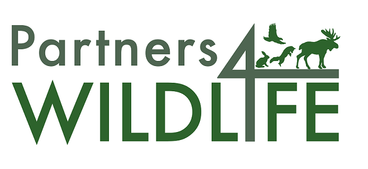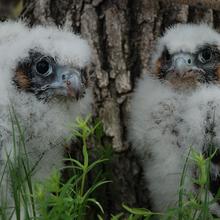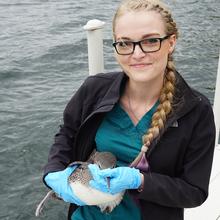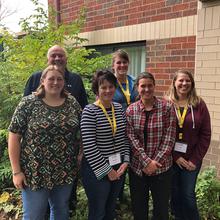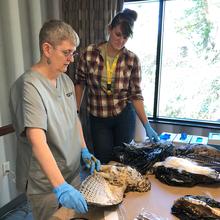Partners for Wildlife (P4W) is a grant-funded initiative housed in The Raptor Center at the University of Minnesota.
P4W works hand-in-hand with wildlife rehabilitators and veterinarians to improve the welfare of orphaned, ill, and injured wildlife of all species. Our goal is to achieve the best and most humane outcomes for wildlife, including:
- Better case management
- More effective treatments
- Improved chances of survival and release back to the wild
- Use of alternative outcomes where appropriate for the animal's best interests
P4W’s program region currently includes seven states: Wisconsin, Minnesota, North Dakota, Montana, Idaho, Washington, and Alaska.
In order to achieve these improved outcomes, we partner with rehabilitators and rehabilitation organizations to provide resources with which to improve the welfare of animals in their care. We also work with veterinarians to enable them to become stronger partners for rehabilitators and build professionalism in clinical wildlife medicine through clinical internships. Finally, P4W strengthens relationships between rehabilitators and veterinarians through year-long fellowships that build the capacity of both groups.
Partnerships
Partners for Wildlife provides permitted wildlife rehabilitators and rehabilitation organizations a chance to partner with an experienced master rehabilitator to identify opportunities and implement solutions that improve animal welfare. In order to do this, P4W provides small grants to improve/upgrade facilities, purchase equipment/supplies, take advantage of educational opportunities, and advance organizations’ operations/management capabilities.
Veterinary Internships
Recognizing the importance of training the next generation of veterinarians specializing in clinical wildlife medicine, P4W provides two clinical veterinary internships annually for practicing veterinarians who aim to work in wildlife rehabilitation settings. Internships are tailored to provide experiences in clinical wildlife medicine in both an academic setting (The University of Minnesota’s Raptor Center and the Washington State University’s wildlife clinic) and a nonprofit setting (the Wildlife Rehabilitation Center of Minnesota and the Progressive Animal Welfare Society’s wildlife center).
Fellowships
Year-long fellowships are designed to bring together three wildlife rehabilitators and three veterinarians for a series of activities aimed at educating and empowering these two groups to work together for the benefit of the wildlife in their care. Fellows engage in a kickoff workshop, attend the National Wildlife Rehabilitators Association annual symposium, complete a project, and engage in a series of participatory webinars based on the tradition of medical rounds. Fellows form lasting relationships with each other and become ambassadors for animal welfare in wildlife rehabilitation settings.
Community-Building
Partners for Wildlife provides opportunities for rehabilitators and veterinarians to share skills and knowledge, access information and services, and combine data in order to advance the science of rehabilitation medicine. P4W also strives to catalyze a sense of community and identity among the wildlife rehabilitation sector, creating a professional community of practice that is vibrant and rigorous.
